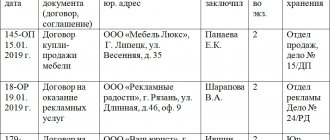Contracts that are legally binding
By its legal nature, an agreement is a voluntary expression of will of two or more parties.
There are exceptions when a binding contract is required by law. This requirement is established for participants in a transaction by Article 455 of the Civil Code of the Russian Federation. The document is drawn up in the form of an additional agreement or contract. Article 445 of the Civil Code of the Russian Federation does not establish a specific list; the norm is reference. Here are some examples of binding contracts:
- Agreement on additional payment or reimbursement of insurance premium due to an increase (decrease) in insurance risk - Part 9 of Art. 11 Federal Law dated June 14, 2012 No. 67-FZ.
- Government defense contracts. The mandatory nature of its conclusion is established by Part 6 of Art. 6 of the Federal Law of December 29, 2012 No. 275-FZ.
- The party to the agreement is a participant in a natural monopoly; such entities do not have the right to refuse to conclude a transaction in the event of a consumer request. The requirement is established by clause 1 of Art. 8 of the Federal Law of August 17, 1995 No. 147-FZ.
- Organizations that occupy a leading position in the market (or whose production volume of defense orders exceeds 70%) do not have the right to refuse to conclude a government contract - Part 2 of Art. 110 Federal Law dated 04/05/2013 No. 44-FZ.
- In exceptional cases, the mandatory conclusion of an agreement is established by the government of the Russian Federation - clause 7 of Art. 3 of the Federal Law of December 13, 1994 No. 60-FZ.
The parties have the right to agree on the terms and conditions that they will accept for execution in the future. For this purpose, legal entities and individuals have the right to enter into a preliminary agreement. This situation applies to those when a person is obliged to enter into an agreement arising from preliminary obligations. By virtue of Art. 429 of the Civil Code of the Russian Federation, the form of such an agreement requires compliance with the main one. For example, a preliminary agreement for the purchase and sale of a vehicle is drawn up in writing and does not require state registration or notarization.
Selecting a counterparty
Finding a business partner is the first step in concluding any deal. The correct choice of counterparty will ensure proper execution of the contract, and also minimize the risk of administrative, tax and any other legal liability incurred by a contract with an unscrupulous party. As a rule, when concluding an agreement, the parties are guided by already established relationships, and the need to find a new counterparty arises in the event of claims regarding fulfilled obligations or due to the lack of previous practice on the subject of the agreement. To secure the conduct of bilateral relations, it is necessary to collect all possible information about the organization of the counterparty. The basis of such information should be:
- the fact of entering information about the organization into the Unified State Register of Legal Entities (USRIP);
- copies of constituent documents;
- information on the execution of specific contracts, the quality of their execution and deadlines.
This information can be found on the Internet, requested from government agencies (information about making an entry in the Unified State Register of Legal Entities can be found on the Federal Tax Service website) or from the counterparty itself. All collected information must be saved in the form of printed documents, screenshots, links to sites with information. The collected materials, if necessary, will help prove in court your prudence in choosing a counterparty.
Arbitrage practice
In practice, there are situations in which the parties enter into a preliminary agreement, but subsequently refuse to execute it. When resolving a dispute, the conclusion of an agreement in court is carried out by filing a claim for compulsion. Based on the results of its consideration, the court makes a decision. This provision is established by paragraph 38 of the resolution of the plenum of the Supreme Court of the Russian Federation dated December 25, 2018 No. 49. At the time of consideration of the dispute, the court is obliged to check the agreement underlying the claim for essential conditions. For purchase and sale, such conditions include the item (name, identification data, address, brand, model). In the case of conditions on the subject, the transaction is recognized as not concluded and does not give rise to rights and obligations. At the time of the preliminary meeting, it is established in which cases the conclusion of an agreement is mandatory and whether all conditions are met. The court checks the agreement on the above grounds, even if there is no position of the defendant on this issue (resolution of the Eleventh Arbitration Court of Appeal dated 07/08/2019 No. 11AP-6684/19). Article 445 of the Civil Code of the Russian Federation provides for the possibility of recovering losses caused by ignoring the fulfillment of established conditions. To minimize financial losses, you have the right to provide for penalties. Penalty for the purpose of ensuring the fulfillment of obligations - Resolution of the Presidium of the Supreme Arbitration Court of the Russian Federation dated 04/08/2014 No. 16973/13 in case No. A40-118038/12-105-1100.
What do you risk when concluding an agreement: TOP risks and ways to avoid them
The most common risk is choosing a problematic counterparty . It is necessary to check business partners carefully, because... here we are talking not only about direct possible losses - lack of payment, delayed deliveries, refusal to return an advance payment, etc., but also tax damage - removal of VAT and expenses. The Federal Tax Service is now actively using electronic services, inter-report reconciliation, and counter checks.
If your counterparty is unreliable, then at best you face a request for a whole bunch of documents, at worst - serious financial losses and additional taxes.
The second risk in our TOP is the lack of appropriate authority among the persons signing the agreement . By default, only the director has the right to sign documents indisputably on behalf of the company. Other employees receive this right by issuing a corresponding power of attorney or on the basis of an order. The contract must indicate the basis on which one or another person signs it.
Example of a preamble to an agreement: Sputnik LLC, hereinafter referred to as the Supplier, represented by commercial director Ivanov I.I., acting on the basis of power of attorney No. 456 dated February 1, 2021, and Petrov and Co LLC, hereinafter referred to as the Buyer, in represented by manager Sidorov S.S., acting on the basis of Order No. 6 of December 31, 2021...
The powers granted have boundaries and deadlines. Let’s say a manager can sign an agreement, but does not have the right to make changes to it, and his power of attorney is valid only for 1 month.
The power of attorney must contain information about the principal and the authorized representative, have a number, date, and expiration date.
Very often, documents related to a transaction - agreements, protocols of disagreements, correspondence and others - are lost or duplicated . To avoid this, you need to create a convenient documentation archive.
EDMS allows you to reduce the risks of working with contracts.
Forms of transaction: oral and written
Civil legislation knows only two forms in which a transaction can be concluded: oral and written (Clause 1 of Article 158 of the Civil Code of the Russian Federation).
In turn, the written form is divided into simple and notarial. And a simple written form, when it comes to bilateral or multilateral transactions (i.e., contracts), can take a wide variety of forms. This is not only a familiar paper document in which all the conditions are stated, the parties are named and their signatures are required. Agreements can also be concluded through the exchange of letters, telegrams, telexes, telefaxes and other documents, including electronic documents transmitted via communication channels (clause 1 of article 160, clause 2 of article 434 of the Civil Code of the Russian Federation). In this case, the main thing is that the exchange method used allows one to reliably establish the fact that the author of the document is the other party. We'll talk about how to fulfill this condition later. Now let’s continue to consider possible options for a simple written form of the contract.
Draw up contracts for free in Kontur.Elbe using ready-made templates
In addition to a single document signed by the parties, as well as the exchange of documents, the Civil Code knows another type of written form of agreement. This is the sending by one party of a written proposal to conclude an agreement and the performance by the other party of actions to fulfill the terms of the agreement specified in this proposal, for example, for shipment or payment (clause 3 of Article 434, clause 3 of Article 438 of the Civil Code of the Russian Federation). Simply put, in a situation where one party simply issues an invoice containing an indication that after payment within the established period the goods, works or services specified in it will be shipped, and the second party pays this invoice within the established period, an agreement is concluded between the parties . Moreover, such an agreement is considered to be concluded in writing, even if a separate document signed by both parties is not drawn up.
Let's summarize: the simple written form of the transaction is considered to be complied with in the following cases.
- The parties drew up and signed one document, which set out all the terms of the agreement.
- The parties agreed on all the terms of the contract in letters or other “unilateral” documents that they exchanged.
- One party sent the other a written proposal to conclude an agreement on certain conditions (for example, issued an invoice), and the other party, in response to this proposal, took actions to fulfill the terms of the agreement specified in it (for example, paid it within the period specified in the invoice).
What terms of the contract are essential?
Essential are the terms of the contract that are necessary and sufficient for its conclusion. This condition is always the subject of the contract.
These are also conditions that are named in legal acts as essential or necessary (mandatory) for contracts of this type. For example, for an insurance contract, this is the condition regarding the insured event.
The condition that must be agreed upon at the request of one of the parties will also be significant.
Without essential conditions, the contract is not concluded. However, it will be valid if the parties comply with it (clauses 1, 3, Article 432 of the Civil Code of the Russian Federation).
What are the consequences of signing a contract by an unauthorized person?
An agreement is considered concluded with the party on whose behalf it was signed if the other party did not know and should not have known about the absence (limitation) of the person’s authority to sign the agreement. In addition, the agreement will be considered concluded with the organization on whose behalf it is signed if its director or authorized representative approves this agreement.
Under certain conditions, an agreement signed on behalf of a legal entity in excess of authority may be declared invalid.
In other cases, such an agreement is considered concluded with the person who signed it. In this case, you can demand that he fulfill the obligation or refuse the contract.
In what cases is the absence of essential conditions compensated by the execution of the contract?
If the parties did not agree on any essential condition, but then fulfilled the agreement, it is considered that they eliminated the need to agree on such a condition and the agreement was concluded (see Positions of the Armed Forces of the Russian Federation, the Supreme Arbitration Court of the Russian Federation).
The actual execution of the contract must be bilateral. Unilateral actions cannot indicate the conclusion of a contract. For example, the transfer of funds in itself cannot clearly indicate the conclusion of a loan agreement when there is no original of this agreement (see Position of the RF Armed Forces).
In addition, in some cases, the absence of a signed contract cannot be compensated for by its execution.
Also keep in mind that the party that has accepted from the other party full or partial performance under the contract or otherwise confirmed the validity of the contract, as a general rule, does not have the right to demand recognition of this contract as not concluded due to the principle of “estoppel” (clause 3 of article 432 of the Civil Code of the Russian Federation, p. 6 Resolution of the Plenum of the Supreme Court of the Russian Federation dated December 25, 2018 N 49).
Subject of the agreement
The contract should specify the actions of each party, which, in essence, is the subject of the contract. If the parties do not agree on the subject of the agreement, the transaction will be considered unconcluded. The agreement must contain an item of expenses for the execution of the agreement indicating the responsibilities of the parties (costs of delivery of goods, its installation, expenses and responsibilities associated with state registration of the agreement), as well as the possibility of reimbursement of these expenses by the counterparty. Additional costs for the execution of the contract are of particular importance in relation to customs duties and duties when concluding foreign economic contracts. Particular attention should be paid to the quality of the product if it is the subject of a contract. The product must comply with mandatory legal requirements, if any. The certificate is the optimal documentary evidence of the quality of the product. It must also be requested from the counterparty in advance.
Under what conditions can a contract signed by an unauthorized person be invalidated?
This is possible if the following conditions are simultaneously met (clause 1 of Article 174 of the Civil Code of the Russian Federation):
1) the head of the organization is limited in powers by the charter or other documents of the legal entity in comparison with the law, and the representative by power of attorney is limited by the regulations on the branch (representative office) or by an agreement in comparison with the power of attorney. Either the powers of the director or representative under the power of attorney are limited in comparison with what they might be considered obvious from the environment in which the transaction is made;
2) the head or representative of the organization, by proxy, went beyond the established restrictions when signing the agreement;
3) a claim for invalidation of the contract was filed by a person in whose interests the restrictions were established (for example, a participant in a legal entity);
4) it is proven that the other party to the contract knew or should have known about the restrictions. This may be evidenced, for example, by a receipt from the counterparty confirming receipt of a copy of the charter (branch regulations) for review. This fact must be proven by the one in whose interests the restrictions were established (see Position of the RF Armed Forces).
Please note that the interested party will be able to challenge your transaction, even if it did not entail adverse consequences for him (see the Position of the RF Armed Forces).
Guarantees when drawing up an employment contract
The conclusion of an employment contract is accompanied by a number of guarantees (Article 64 of the Labor Code of the Russian Federation):
- its registration cannot be refused without sufficient grounds;
- refusal to conclude an employment relationship due to pregnancy or the presence of children, as well as for other reasons not related to the employee’s business qualities is prohibited;
- there is an obligation to draw up an agreement no later than 1 month from the date of dismissal from his previous job if the employee is transferred to the employer at his written invitation;
- if there is a written request, the employer must, no later than 7 working days, notify in writing the person who received the refusal to employ him, the reasons for this refusal;
- the employee has the right to appeal the refusal of employment in court.
In the guide to personnel issues from ConsultantPlus you will find step-by-step instructions with expert explanations on applying for a job. If you do not have access to the K+ system, get a trial online access for free.
Acceptance of work performed by a contractor, even without a contract, provides for payment for it
In addition, relations between the parties often develop so rapidly that the formalization of contractual relations is relegated to the background, and the interested party in obtaining results is the customer, who most often, having received the result he needs in the form of delivered goods (works, services), subsequently tries to “save "on their payment.
ASMO, in its Resolution dated March 5, 2020 in case No. A40-294890/2018, having examined a similar situation, established:
1) Between Avangard LLC and the State Budgetary Institution “Zhilishchnik of the Gagarinsky District”, on the basis of an offer sent by the State Budgetary Institution “Zhilishchnik of the Gagarinsky District”, an agreement was reached to carry out a major overhaul of the roofing of a residential building.
The above agreement was reached in accordance with clause 5.1 of Article 3 of the Federal Law of July 18, 2011 N 223-FZ “On the procurement of goods, works, services by certain types of legal entities”, since the major repairs of the roofing were caused by the hurricane that passed in Moscow.
2) State Budgetary Institution “Zhilishchnik Gagarinsky District” the work was accepted without comments, which is confirmed by ff. KS-2, KS-3.
3) Acceptance of the received offer in accordance with clause 3 of Art. 438 of the Civil Code of the Russian Federation was the fulfillment of work by Avangard LLC in full in accordance with the terms of the offer. Thus, the court concluded that a contractual relationship had arisen between the parties, and the work performed must be paid for.
It is not entirely clear what such unscrupulous applicants are counting on, denying the existence of an agreement as a document, but recognizing the very fact of delivery of goods (works, services). There are other situations as well.
When the parties agreed on all the conditions provided by law for a contract of this type, but forgot to agree on one.
For example, this is typical for construction contracts.
According to paragraph 4 of the Information Letter of the Presidium of the Supreme Arbitration Court No. 51 dated January 24, 2000, the absence of a deadline for the completion of construction work indicates that the contract has not been concluded.
At the same time, a conscientious contractor who completed construction work and the customer accepted this work cannot be deprived of payment for his work.
According to clause 6 of the Information Letter of the Presidium of the Supreme Arbitration Court dated November 25, 2008 N 127, if the contract is not concluded, since the parties did not agree on the term for the completion of the work, but the customer accepted the work performed by the contractor, the latter’s demands to recover from the customer the cost of the work performed in the amount , provided for in the contract (provided that a different cost of the work has not been proven), and interest for the use of other people's funds are subject to satisfaction on the basis of clause 1 of Art. 1102 and paragraph 2 of Art. 1107 of the Civil Code of the Russian Federation, i.e., based on the rules on unjust enrichment.









